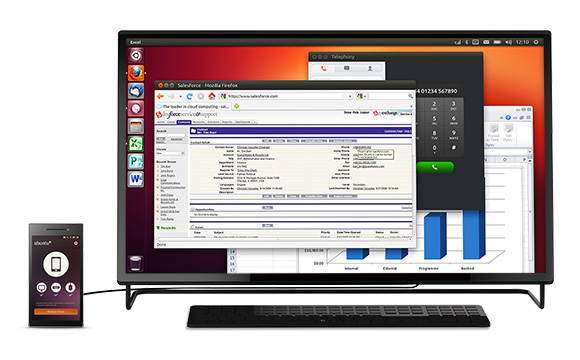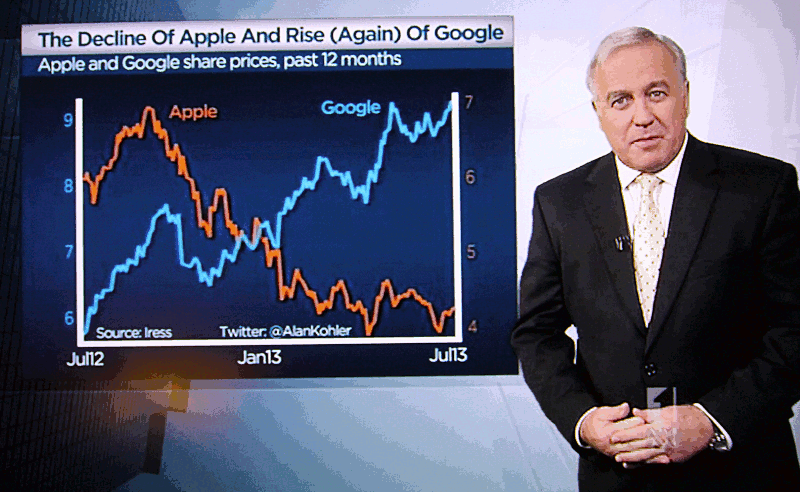
-
I still have hopes that both iOS and Android will die in agony.
-
Ditto! (Why did the Firefox phone only get launched in the poor countries?)
-
Sorry, I forgot to add Firefox OS in my list :-)
As for poor countires - I think because most Firefox phones are utter crap.
-
@Vitaliy_Kiselev I'm afraid one of the vague hopes of sending iOS and Android to agonising deaths is in an open source OS and lots of us opting for simplicity . Maybe people can write enough commonplace apps in html for these phones and then a cheap phone will be all a lot of us will need.
-
I'm afraid one of the vague hopes of sending iOS and Android to agonising deaths is in an open source OS and lots of up opting for simplicity .
I do not care about open source.
Maybe people can write enough commonplace apps in html for these phones and then a cheap phone will be all a lot of us will need.
It is most horrid option - to write apps in javascript and html. Ouch.
-
With Android, for me the main objection is their revenue model - as part of the big Google profiling principle. It works partly on the cheap printer>then expensive ink principle. You get the phone cheap and then each day Google finds a new creative way to get money out of you.
I've cyanogenmodded my SIII, rooted it and installed everything I can to try and take control, yet I wonder why I bother. The phone - no longer a Samsung at OS-host layer, but still Android, keeps trying to download obligatory apps to "enhance my experience." When I look closer it's quite often a trade-off to enhance the big picture for Google.
Apps, for me, need to be fewer and better. At present, many are written by guys with a good idea but working alone and launching their app unfinished. To make a good app Like SwiftKey, you really need a good team and investment. Just one iffy app on your phone creates little inconvenience - but a whole phone-full can make your phone an unpleasant place to be. Samsung's own apps on my phone before Cyanogenmod were solid but I kept getting "you are not allowed to do this" alerts from Samsung. So I modded the phone, lost those apps but got a better device.
Apple's iOS, like Google's Android, is Unix-based, like almost all computing outside Microsoft. Deep inside they're similar. Apple's own iPhone apps are well-built. They have more control over privately-written apps. For me, I want to control my phone at the same time as the stability an iPhone would offer me. Apple's revenue model is still the old pay-up-front. Then you pay for apps and downloads. The whole iPhone package for me is over priced. Anything I can't take afford to take apart on day one and possibly brick is just ruled-out.
As I said before, we all naturally transfer our tribal loyalty to entities which don't deserve it. For example the adage,
"Google is your friend"
Should not be taken literally. A lot of your important stuff is on your devices. Trusting in Apple is likewise riding on the back of the tiger. Apple will be your friend for a big part of the way until that point where your interests no longer coincide with their own. In a way, it can be helpful for us to look at these rival companies and ask ourselves whether they are more likely frenemies than our friends.

Alternatives, besides Windows and Nokia?
With the Html-based Firefox OS phone, it's a wait-and-see thing for me. Html5 is capable of some surprising features. The system will have to develop a critical mass of users in order for apps to be developed.
Samsung has its own plans regarding our phones, too. They are likely to be another contender.
-
You might be tempted to buy (Or invest in!) the proposed Ubuntu Phone distro:
Canonical launches insanely ambitious Ubuntu Edge phone crowd-funding campaign
Ubuntu [Canonical] say:
Introducing the superphone that’s also a full PC http://www.ubuntu.com/phone
-
Ubuntu Edge is dead, long live Ubuntu phones
Canonical raises an impressive $12.8 million, but it needed $32 million.
Canonical's attempt to raise $32 million to build the Ubuntu Edge, a powerful phone that can double as a desktop when docked with a monitor, mouse, and keyboard, has failed. The crowdfunding campaign on Indiegogo took in "only" $12.8 million before the deadline passed a few hours ago.
"The Ubuntu Edge phone would have been "years ahead" of other mobiles — a handset that offered a glimpse of how phones would be used in future, says Mark Shuttleworth, Canonical founder and driving force behind the Edge."
-
The Ubuntu Edge phone would have been "years ahead" of other mobiles — a handset that offered a glimpse of how phones would be used in future, says Mark Shuttleworth, Canonical founder and driving force behind the Edge."
This guys mean thet phones will be something like your main computer :-) And this is just wrong idea.
-
Actually there are a lot of people who will not know if they miss their computer if they can access mail and social networking sites:-)
-
Until my phone can run actual Photoshop or LR, there is zero point of me having a device with a ARM chip, like any of these phones. How much would one of these high end ARM chips suck at running WINE? Would it ever be worthwhile?
-
Oh there are some real advantages to accessing your phone by keyboard, mouse and monitor so as to get some stuff done in a non-fiddly way on a phone which you'll then unplug and take away on holidays because it's all the computer you need on that particular trip.
But if I never donated to the Ubuntu Phone project it's rather because their intent was unclear.
And also BTW, didn't another phone manufacturer already try that keyboard/monitor thing a few years ago?
-
Actually this is may be off topic now. But still the point regarding Ubuntu phone is; if they collected 32 million dollars whether it would have floated the idea. I seriously doubt it. On the other had may be collectively we saved 12. 8 million going down the drain to some Chinese company.
-
Unlike with PCs, the only way you can mass-install your own OS on phones without licensing issues is to produce your own hardware with your own ROM inside. [Some day we'll probably be able to install Android, any Linux distro, Mozilla Phone OS , Windows or even iOS - on the hardware phone of our choice].
Instead, the proposed Ubuntu phone would have been just one more of the same choices we have now - but from another vendor.
Canonical's revenue stream from Ubuntu support services has been dwindling along with consumer trends away from desktops toward tablets and phones. Their Ubuntu Software Centre has started to include paid applications - but that's not going to be enough to save their bacon. I see this phone-computer idea of theirs as a clutching at straws; instead of offering users a solid OS like Ubuntu Touch with key apps refined by big teams; the whole of which could install on any OS-neutral phone, they went and promoted this Swiss-Army-Knife-Phone idea. Nobody, as far as I know,was crying out for anything like this.
-
Ubuntu Touch OS launching Oct. 17, ready for supported Android devices
(Includes a screen-dock mode) So far, Beta-supported devices have included the Nexus 4, Galaxy Nexus, Nexus 7 and Nexus 10.
Canonical says the first discrete devices running the OS aren’t expected until late 2013 or early 2014. PC World
Because the Ubuntu Edge won’t make it to the market, you will have to flash it manually. At least until/if Ubuntu gets a smartphone partner or releases a device.
why exactly would us Android fans ever want to get rid of our favorite mobile OS for Ubuntu Touch OS?

http://phandroid.com/2013/09/23/ubuntu-touch-os-release-october-17/
-
Samsung ordered to pay Apple $290 million for copying iPhone and iPad features

Samsung shareholders will be crying into their beer over this one .. ;-)
-
tablet with Ubuntu Touch coming in December?
In the latest of these (non-"customer is the product") promises, this quirky item seems to be having a first go at the hat-trick of getting Linux to talk to a tablet's hardware, from GPS to accelerometer to proximity sensor - and all without Google's Android layer on top of the Linux kernel.
Phoronix reports a tablet called the UT One is in development by Demski Group and Mastermind Hardware and Logistics. It’s possible the groups are just loading Ubuntu on an OEM-made device that would otherwise ship with Windows or Android, but that doesn’t change the fact that the UT One could be one of the first tablets sold with the new touch-friendly version of Ubuntu as its primary operating system.
Like lots of other people, I wish them luck.
http://liliputing.com/2014/10/ut-one-tablet-ubuntu-touch-coming-december.html
-

The UT One tablet is arriving at the end of a year in which tablet sales have begun to slow down.
http://linuxgizmos.com/atom-based-ubuntu-touch-tablet-specs-leaked/
see also
Some people don't want iOS devices, with their strict control over what users can and can't install and little to no access to the underlying code. And many don't want Android either, with its app store that contains lurking malware and countless trivial games, not to mention Google's overbearing countenance smiling down semi-benignly..
http://www.idgconnect.com/blog-abstract/9015/will-ubuntu-linux-tablet-shake-up-market
-
Linux Tablet Developer Crowdfunds Mobile App Tools for Ubuntu, Android, iOS
..a Kickstarter campaign to support development of MAGE, a platform for building mobile apps without having to write code.
MAGE—which, by the way, is an acronym for Mobile Application Generation Environment—already exists. The Kickstarter campaign aims to enhance it, specifically by making it compatible with Apple's HealthKit and extending support to Ubuntu Touch.
-
Android ups its lead over iOS
For the three months ending September, Android's share of the US smartphone market was 52.1 percent, up slightly from 51.9 percent for the prior three months. Over the same period, Apple's share dipped to 41.7 percent from 42.1 percent.
Looking at other smartphone platforms, ComScore placed Microsoft's Windows Phone in third place with a market share of 3.6 percent, inching up from 3.4 percent. BlackBerry remained virtually static with a share of 2.3 percent, down slightly from 2.4 percent.
-
Kantar: Apple On Track For ‘Record Quarter’ As iPhone 6 Sales Bump Up Its Market Share Vs. Android:
Apple is DOOMED
-
http://mobile.osnews.com/story.php/28129/Announcing_Ubuntu_Core_with_snappy_transactional_updates
New Ubuntu phone "core" image beta released.
-
The chart below shows how Android’s share is projected to decline from 67.7% in 2014 to 64.0% in 2018. It also shows how the iOS share is projected to decline from 27.5% to 24.5% during the same time period. The main beneficiary of this lost market share is expected to be Microsoft Corporation’s (MSFT) Windows. IDC predicts that its market share will increase from 4.6% in 2014 to 11.4% in 2018.

http://www.marketrealist.com/2014/11/google-looking-expand-android-ones-reach-indias-success/
The number of people willing to give or receive an Apple product during the current holiday season has dropped by 3% to 15% compared to last year’s 18%
Howdy, Stranger!
It looks like you're new here. If you want to get involved, click one of these buttons!
Categories
- Topics List23,964
- Blog5,723
- General and News1,342
- Hacks and Patches1,151
- ↳ Top Settings33
- ↳ Beginners254
- ↳ Archives402
- ↳ Hacks News and Development56
- Cameras2,361
- ↳ Panasonic990
- ↳ Canon118
- ↳ Sony154
- ↳ Nikon96
- ↳ Pentax and Samsung70
- ↳ Olympus and Fujifilm99
- ↳ Compacts and Camcorders299
- ↳ Smartphones for video97
- ↳ Pro Video Cameras191
- ↳ BlackMagic and other raw cameras121
- Skill1,961
- ↳ Business and distribution66
- ↳ Preparation, scripts and legal38
- ↳ Art149
- ↳ Import, Convert, Exporting291
- ↳ Editors191
- ↳ Effects and stunts115
- ↳ Color grading197
- ↳ Sound and Music280
- ↳ Lighting96
- ↳ Software and storage tips267
- Gear5,414
- ↳ Filters, Adapters, Matte boxes344
- ↳ Lenses1,579
- ↳ Follow focus and gears93
- ↳ Sound498
- ↳ Lighting gear314
- ↳ Camera movement230
- ↳ Gimbals and copters302
- ↳ Rigs and related stuff272
- ↳ Power solutions83
- ↳ Monitors and viewfinders339
- ↳ Tripods and fluid heads139
- ↳ Storage286
- ↳ Computers and studio gear560
- ↳ VR and 3D248
- Showcase1,859
- Marketplace2,834
- Offtopic1,319









